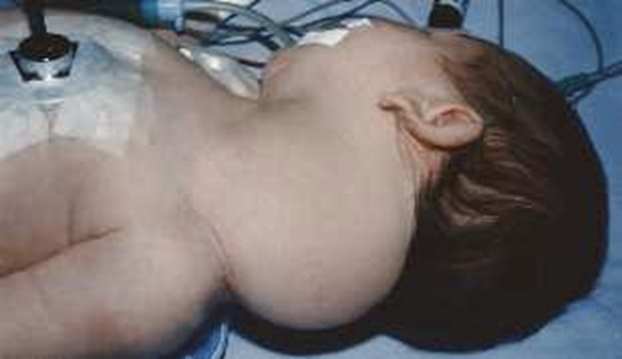Sclerotherapy of Lymphangiomas
Lymphangiomas are benign tumors of lymphatic vessels that have the potential to infiltrate surrounding structures. They result from the abnormal development of the lymphatic vessels.
Usually, lymphangiomas are clinically evident at birth or are noticeable before the second year of age. They can be macrocystic or microcystic type depending on the size of the cysts that compound the mass. They are most often found in the neck, head, and axilla. Detailed ultrasound exam and Magnetic Resonance Imaging (MRI) is important for planning the therapeutic approach.
Currently, fetal lymphangioma can be diagnosed by the prenatal ultrasound which can provide a clear differential diagnosis from other cystic fetal masses. Prenatal diagnosis is important as it permits planned delivery and prompt postnatal resuscitation and improves prognosis.
In neonates that are at risk to develop life-threatening complications due to large lymphangioma, interventional therapy should be the first-choice treatment.
As the lymphangioma is a benign malformation, non-surgical treatments have been developed to avoid an extensive operation that can leave permanent postoperative sequels.In 1987, Ogita proposed the sclerotherapy with injections of OK-432 (Picibanil) with promising results. For about 30 years, the Ogita’s Foundation has provided OK-432 to many pediatric surgery centers worldwide. His method has been applied in a large series of patients and retrieved the same good results. Unfortunately, this program has been discontinued some years ago. Meanwhile, other agents for sclerotherapy have been used as bleomycin, ethanol + STS (sodium tetradecyl sulfate), and doxycycline. Under sedation, the chosen substance is administered with percutaneous injection into the cystic lesion under radiological and/or ultrasonographical examination.
Recently, some oral drugs have shown promising results in lymphangioma therapy, like sildenafil, sirolimus, and TJ-28 (Eppikajyutsuto). The tolerance of the therapy and adverse effects must be considered, especially in neonates.


